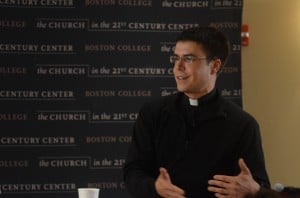
Photo: “in the gutter” by Len Matthews (Flickr/Creative Commons)
As a newly appointed associate pastor, I found the e-mail conversation that took place recently between Ross Douthat and Jim Martin at America Magazine to be a breath of fresh air, both for its openness and honesty and for the sights I can glean from it. Perhaps surprisingly, I found Douthat’s “less” pastoral approach more pastorally helpful than the “more” pastoral approach of Jim Martin. Let me explain briefly.
I was struck by Douthat’s perspective on how apparent mercy can sometimes work against grace:
As I’ve written elsewhere, if pharisaism and elder brotherism are always a temptation for dogmatists, then the temptation for progressives comes wrapped in Cardinal Kasper’s remark that certain forms of moral heroism are “not for the average Christian.” In that attitude, it seems to me, there’s a kind of Grand Inquisitorial paternalism at work—an attitude that would try to slip as many “ordinary” Christians into heaven by protecting them as much as possible from Jesus’s most rigorous demands. And theological issues aside, such paternalism comes with its own cost in this world, because cheap grace often isn’t really grace at all, and where one set of hard obligations gets lightened a different set of miseries often gets imposed.
This paragraph captured my attention in particular because it helped me understand why I find myself in the middle on the whole synod discussion. On the one hand, I like what Pope Francis seems to be doing by pushing for a kinder way of treating those in difficult situations. Jim Martin draws an analogy to a town changing its penalty for speeding:
Let’s put it this way. Imagine a town that has posted speed limits of 35 miles an hour. Now imagine that a newly passed law has dropped the penalty for speeding from a week in jail to a fine of $100. Perhaps the voters thought that a week in jail was too severe. Perhaps they saw how across-the-board applications of that penalty were too draconian. This does not mean that the speed limit has changed: it is still 35 miles per hour. Rather, the way one deals with those who have transgressed the law has changed.
I think this is a fair comparison. No one, Kasper or anyone else, was questioning the indissolubility of marriage. And so for those in certain situations, a fine is much more appropriate and pastorally sensitive than a night in jail.
On the other hand, sometimes the more pastoral solution cuts in a different direction. Frequently enough, people of every ideological stripe complain that homilies do not challenge them enough. Progressives want more hard-hitting homilies on economic justice and racial issues, for example, and conservatives want more on abortion and contraception, but everybody seems to want more challenging homilies. No one wants the paternalistic pat on the head, and these days, the American hierarchy is in no position to administer it.
Douthat cautions that the real concern when the sense of challenge is lost is that we
become a church of long communion and short confession lines (and you’re more likely to find me in the first than the second), of Jesus-affirms-you sermons and songs, of marriage preparation retreats (like mine) where most of the couples are cohabitating and nobody particularly cares.
That at least is also my experience as a new pastor. The “average Christian” needs both mercy and challenge, and neither at the expense of the other. If the speed limit indeed cannot change, then it does no one any favors by explaining away the duties and obligations of a driver. Long confession lines complement long communion lines, and neither should exist without the other. In an age that stresses inclusion and tolerance, it might be important to place some emphasis on the speed limit, just as a more merciful approach to penalties might have needed more emphasis in a previous age. Neither approach is necessarily any more or less pastoral than the other. Francis has upped the ante by placing a premium on both.












